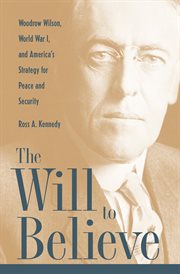Nonfiction
eBook
Details
PUBLISHED
DESCRIPTION
1 online resource
ISBN/ISSN
LANGUAGE
NOTES
In many ways, Woodrow Wilson and the era of World War I cast a deeper shadow over contemporary foreign policy debates than more recent events, such as the Cold War. More so than after World War II, Wilson and his contemporaries engaged in a wide-ranging debate about the fundamental character of American national security in the modern world. The Will to Believe is the first book that examines that debate in full, offering a detailed analysis of how U.S. political leaders and opinion makers conceptualized and pursued national security from 1914 to 1920. Based on extensive research gleaned from public documents, presidential papers, and periodicals, The Will to Believe departs significantly from existing scholarship, which tends to examine only Wilson or his critics. This is the first study of America's approach to the war, which examines all major U.S. perspectives from across the political spectrum and analyzes Wilson's security strategy from the beginning of U.S. neutrality through the end of his presidency. During World War I, there was no consensus among Wilson and his contemporaries on such fundamental issues as the nature of the international system, the impact of security policies on domestic freedom, the value of alliances and multinational organizations, and the relationship between democracy and peace. Historian Ross A. Kennedy focuses on how three competing groups-pacifists, liberal internationalists, and Atlanticists-addressed these and other national security issues
Mode of access: World Wide Web







